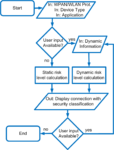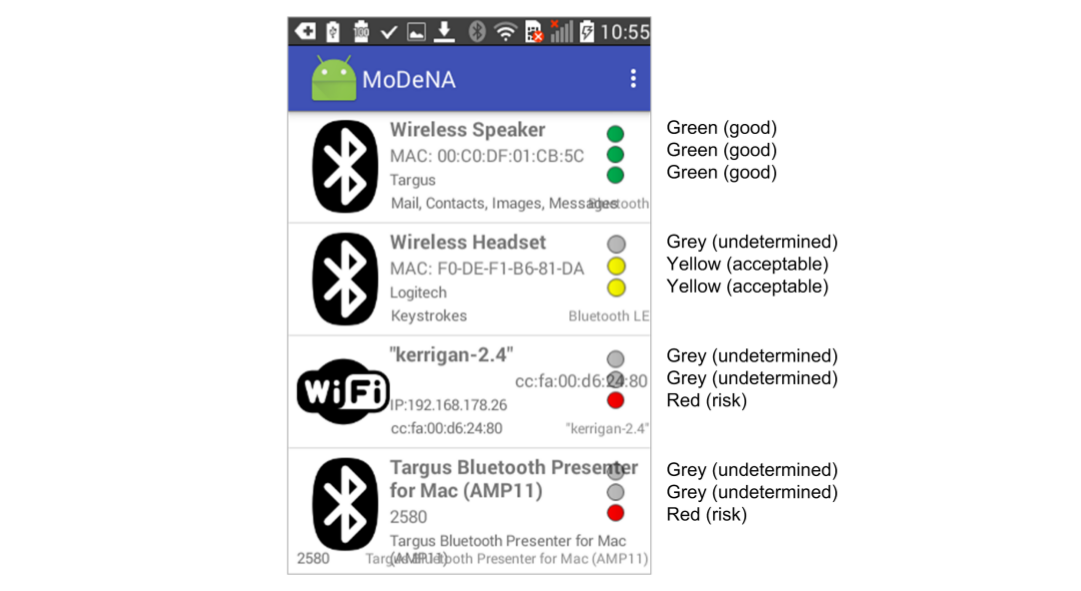
Abstract
Today most used devices are connected with each other building the Internet
of Things (IoT). They communicate with each other directly and share data with
a plethora of other devices indirectly by using the underlying network infrastruc-
ture. In both cases a variety of protocols are used depending on infrastructure,
application (e.g., Smart City, eHealth), and device capability. But the overall
concept of the data sharing is to do it in a secure manner so that different users
(e.g., consumer, facilities, provider) can gain benefits. But what does “secure
manner” means? This is a big question between the stakeholders, especially when
talking of wireless personal and local area networks (WPANs) and wireless local
area networks (WLAN), because the judgment of the security feeling depends
on personal settings (e.g., easy to use, encrypted transmission, anonymization
support). Therefore, MoDeNA – a Mobile Device Network Assistant – was de-
veloped offering an opportunity for understanding the judgment of security by
bringing the user’s concerns and their technology understanding of used devices
and protocols into relation. MoDeNA provides a transparent overview over the
used wireless security of the user’s device giving concrete advices for improving
the connection security, helping to improve usability of mobile device security. As
a use-case the smart city environment is used, because this is the most common
area, where many different WPAN and WLAN connections exist, supported by
different underlying infrastructures, and where secure data transmission is es-
sential, because it is an “open communication area”.
BibTeX (Download)
@techreport{Mueller2017MoDeNA,
title = {MoDeNA: Enhancing User Security for Devices in Wireless Personal and Local Area Networks},
author = {Robert Müller and Marcel Waldvogel and Corinna Schmitt},
url = {https://netfuture.ch/wp-content/uploads/2017/03/kn-2017-disy-02.pdf},
year = {2017},
date = {2017-03-13},
urldate = {1000-01-01},
number = {KN-2017-DISY-02},
institution = {Distributed Systems Laboratory, University of Konstanz},
abstract = {Today most used devices are connected with each other building the Internet
of Things (IoT). They communicate with each other directly and share data with
a plethora of other devices indirectly by using the underlying network infrastruc-
ture. In both cases a variety of protocols are used depending on infrastructure,
application (e.g., Smart City, eHealth), and device capability. But the overall
concept of the data sharing is to do it in a secure manner so that different users
(e.g., consumer, facilities, provider) can gain benefits. But what does “secure
manner” means? This is a big question between the stakeholders, especially when
talking of wireless personal and local area networks (WPANs) and wireless local
area networks (WLAN), because the judgment of the security feeling depends
on personal settings (e.g., easy to use, encrypted transmission, anonymization
support). Therefore, MoDeNA – a Mobile Device Network Assistant – was de-
veloped offering an opportunity for understanding the judgment of security by
bringing the user’s concerns and their technology understanding of used devices
and protocols into relation. MoDeNA provides a transparent overview over the
used wireless security of the user’s device giving concrete advices for improving
the connection security, helping to improve usability of mobile device security. As
a use-case the smart city environment is used, because this is the most common
area, where many different WPAN and WLAN connections exist, supported by
different underlying infrastructures, and where secure data transmission is es-
sential, because it is an “open communication area”.},
keywords = {Internet of Things, Security, Usability, Wireless, WPAN},
pubstate = {published},
tppubtype = {techreport}
}



